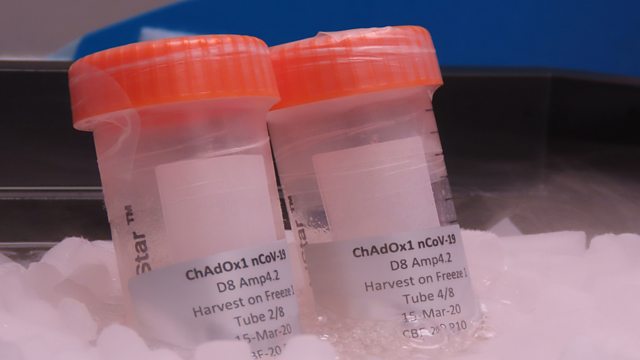Making a Covid-19 vaccine for two billion people
How to make 2 billion doses of a Covid-19 vaccine? New Covid therapy from llamas? Why do some mosquitoes prefer people? Did a mass asteroid bombardment cause Earth to freeze over?
There's been encouraging news about the Oxford Covid-19 vaccine this week from a trial involving about 1,000 people. But how great is the challenge in scaling up from making a few thousand doses of the vaccine to manufacturing two billion by the end of this year? Sandy Douglas of Oxford's Jenner Institute explains how they plan to mass-produce the vaccine safely given the speed and magnitude of the scale up.
A new kind of treatment for Covid-19 may come from an unlikely source: llamas and alpacas, the South American relatives of the camel. Camelids produce unusually small and simple antibodies against viruses, including the coronavirus. This feature may make these molecules an effective Covid-19 therapy. Jane Chambers reports on research in Chile and the UK.
Also in the programme: what has made just a few mosquito species evolve a preference for biting humans, and the theory that 800 million years ago the Moon and the Earth were bombarded by a shower of asteroids which plunged the Earth into a global ice age - an event which changed the course of the evolution of life.
These days we're more acquainted with soap than ever before, as we lather up to help stop the spread of coronavirus. And for CrowdScience listener Sharon, this set off a steady stream of soapy questions: how does soap actually work? How was it discovered in the first place, long before anyone knew anything about germs? Are different things used for washing around the world, and are some soaps better than others?
We set up a CrowdScience home laboratory to explore the soap making process with advice from science-based beauty blogger Dr Michelle Wong, and find out what it is about soap's chemistry that gives it its germ-fighting superpowers. Soap has been around for at least 4000 years; we compare ancient soap making to modern methods, and hear about some of the soap alternatives used around the world, like the soap berries of India.
And as for the question of whether some soaps are better than others? We discover why antibacterial soaps aren't necessarily a good idea, and why putting a toy inside a bar of soap might be more important than tweaking its ingredients.
(Image: A team of experts at the University of Oxford are working to develop a vaccine that could prevent people from getting Covid-19. Credit: Press Association)
Last on
More episodes
Broadcasts
- Sat 25 Jul 2020 23:06GMT大象传媒 World Service
- Sun 26 Jul 2020 15:06GMT大象传媒 World Service News Internet
Podcast
-
![]()
Unexpected Elements
The news you know, the science you don't


